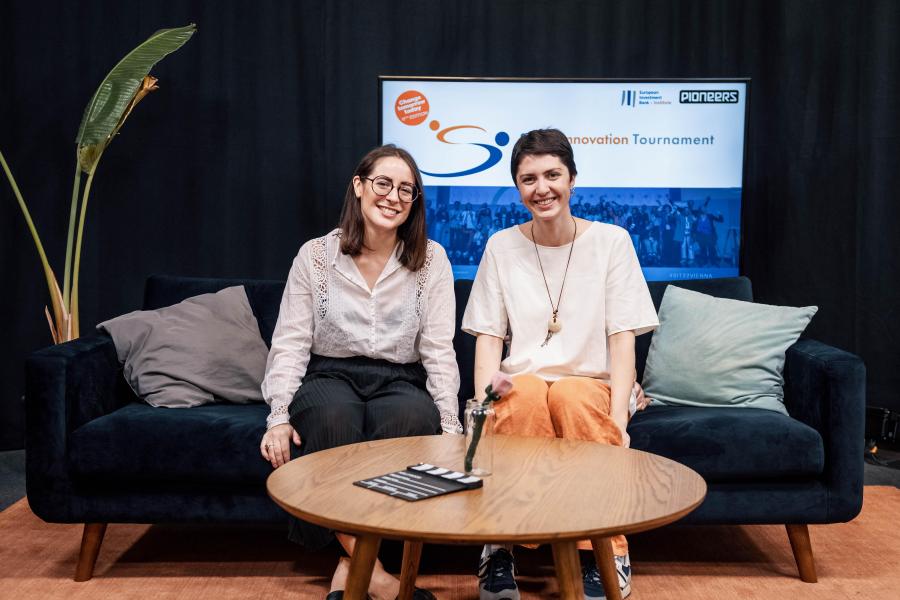An Italian company creates an app to provide treatment for chronic pelvic pain and to bring sufferers together
A few years ago, Gaia Salizzoni and Vittoria Brolis, two friends from Trento, Italy, discovered that both suffered from chronic pelvic pain. It’s not surprising: worldwide, one woman in four is afflicted by it. Affecting women in their reproductive years—and a number of men, too—chronic pelvic pain is defined as a condition lasting for six months or more and occurring anywhere below the belly button and between the hips.
Due to its impact on daily life, around 73% of people who suffer from chronic pelvic pain experience anxiety and depression. There are treatments and medications to address the physical symptoms, but nothing targeted at mental health or psychological well-being. And nobody really discusses it.
Of that first conversation with Vittoria, Gaia recalls, “It was crazy, because we hadn’t heard anybody talk about it before. For us it was like unleashing something, like opening Pandora’s box.”
The two women created Hale, a platform where people suffering from chronic pelvic pain can find advice and peer-to-peer support.
Created in Italy and now based in Berlin, Hale got its name from the English verbs inhale and exhale. “The idea is to breathe in and breathe out,” Gaia explains. “A person meeting our community and solution takes a deep breath, and feels at home, and starts feeling better.”
A library of information on an unspoken health issue
Chronic pelvic pain can be caused by one disorder or a variety of conditions with overlapping symptoms, such as endometriosis, musculoskeletal problems, or irritable bowel syndrome. It is often disabling. As Gaia says, “Imagine feeling persistent pain when peeing, sitting, walking, having sex, or working at the office. It’s like having a strong headache most of the time in your intimate area.”

One woman in four is afflicted by chronic pelvic pain worldwide
The users of the Hale programme start by answering a survey about their symptoms and challenges. Gaia explains, “Based on this data, we personalise a mental health programme that you can act on every day, whenever and wherever you want.”
Each subscriber receives guided sessions of daily content combining psychotherapy and sex therapy and can also explore a library of information.
The platform is composed of three parts: the programme itself, the community, and a tracker to monitor progress over time. The founders work with three scientific advisors from the fields of psychotherapy, sex therapy, and gynaecology, who verify the content and provide strategic guidelines.
So far, Hale has more than 10 000 community members who interact on Telegram and Instagram, discussing their experiences, practices, and tips. The beta version of Hale’s personalised programme is currently open to batches of around 30 people per month.
The app is slated to be launched in 2023 and will be home to all of Hale’s content. The founders estimate that eventually it can help more than 50 million people in Europe alone.

One woman in four is afflicted by chronic pelvic pain worldwide
Gaia says that its high retention rate proves that their offering is useful. “When you have this kind of condition and pain, most of the time you are stuck in daily life and can’t make plans for the future,” she says. “What we have seen is that users start thinking about the future, planning things — traveling, advancing in their career, or making a move they were too scared to take beforehand.”
One woman wrote on the platform, "I realised that I ignored my pain for years, then ignored the diagnosis itself, all out of fear of the pain and that there was no solution.”
Another wrote, "I learned to be aware of my anxiety, to handle it consciously and rationally, overcoming some emotional obstacles with more serenity. And, most of all, I now see problems from a new perspective. Now I listen more to myself, without blame.”
Lack of research and social taboo are major challenges
Hale’s biggest obstacle is that the subject of chronic pelvic pain is a social taboo. “Many times, that hinders us in really getting to the point with partners, clients, investors, or even institutions,” Gaia says. “Lack of research in this field and lack of transparency talking about these issues is really a challenge.”
Gender inequality in healthcare has long been pervasive, with fewer resources dedicated to women’s health issues. In the long term, Hale’s founders want to contribute their own research and data to the field of chronic pelvic pain, where information is so scarce.
The European Investment Bank Institute’s Social Innovation Tournament, which recognises social entrepreneurs making positive social, ecological, or environmental impact in their communities, selected Hale as a finalist in 2022.
